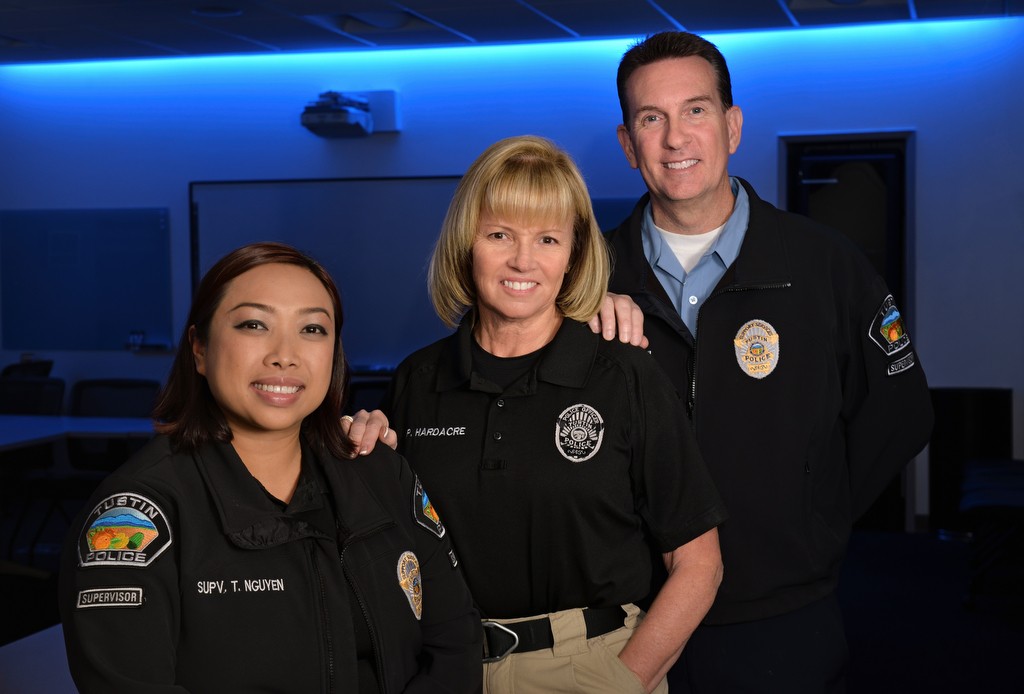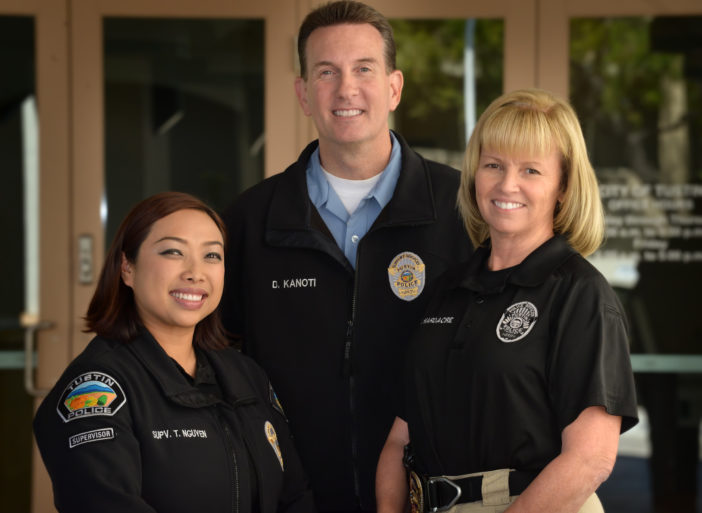Everyone sat outside, expressions of shock, fear or some combination of both on their faces.
Minutes earlier, a man had walked in to the O.C. Boxing and MMA Academy, shot and killed martial arts trainer Fahness Lutalo — a man well-loved in the boxing community.
Several Tustin PD detectives were having lunch up the street when the call came in, rendering them first on scene.
As they investigated, the gym was quiet except for the the shrill interruption of a cell phone intermittently ringing.
That is one of the hard parts.
Detectives know who is likely on the other end of that call — a family member or friend checking on Lutalo because in the world of cell phones and social media, there’s no doubt word had already spread about the shooting.
Investigators can’t answer the phone, so they let it ring.
They leafed through memos, notes and drawings on a lone desk near the gym’s entrance.
“I love you, daddy” drawn on paper in a young child’s writing sends a pang of sadness through one of the detectives.
That part is hard, too.
The child who wrote that loving note would have to be told that Lutalo is gone. And that child’s two siblings also would be told the devastating news.
Many in law enforcement know how to compartmentalize and disconnect from the emotions of a traumatic scene like this because they have to stay focused on their job.
Although incidents like this in Tustin are very rare, every detective who responded to that March 24 call has experienced some kind of trauma — responding to a death, a horrific car accident or a violent call.
When those kinds of things might finally have an emotional or psychological effect differs for every officer, which is why Tustin PD over the last decade has created a safe place for its employees to decompress with its Peer Support program.
“First responders have different needs,” said Kristin Miller, Operations Support Division Manager who oversees the program. “These are people who are going out in the field every day and they’re seeing the really bad side of life — death, injury, fights, violence against others, those kinds of things.”

Members of Tustin PD’s Peer Support team includes Thao Nguyen, records supervisor, left, Det. Pam Hardacre and Dave Kanoti, property and evidence supervisor.
Photo by Steven Georges/Behind the Badge OC
Tustin was one of the first agencies in Orange County to develop a successful Peer Support program after department leaders noticed some employees emotionally struggling after years on the job.
“The chief at the time recognized there were individuals going through tough times in a very public way,” Miller said. “He wanted to put together a team that you could reach out to without being ashamed or feeling inferior.”
A handful of research studies all come to the same conclusion: psychologically and emotionally healthy cops make better and more effective public servants.
Most officers, at one time or another in their career, will need some help maintaining this healthy mental and emotional state, Miller said.
A need for help might come after a particularly rough call that’s tough to shake or after months of maintaining the day-to-day challenges of the job.
And help can come in the form of casually talking with a fellow law enforcement colleague or committing to counseling to get through it.
The idea is to get out in front of it, Miller said.
“Depression is huge,” she said. “That’s one of the things that can happen if issues are not addressed. They can dive into the bottle or start behaving recklessly, it’s just not healthy.”
Tustin encourages its employees to take advantage of the well-founded program run by police employees who are there to listen without judgment and in complete confidentiality.
“There has been a stigma in law enforcement that says, ‘Suck it up and get over it. We don’t have time to be sensitive on these types of things,” said Det. Tommy Lomeli, a member of the Peer Support Team. “The reality is if you ignore these things, you can start deconstructing.
“You need to be able to relieve that stress.”
With a career that puts a constant strain on the mind and body, wellness is essential.
Those in law enforcement have their adrenaline coursing at some level all the time because it is unknown when something as simple as a traffic stop could escalate into a dangerous pursuit.
And on many shifts, it’s not uncommon for an officer to handle something high-stress, such as a domestic violence call, followed by something more mundane, such as issuing a traffic ticket, Miller said.
“This puts a lot of compression on the brain, and you keep adding more layers of trauma,” Miller said.
Dispatchers experience a different kind of stress as they maintain the balance of fielding a high volume of calls while keeping in contact with officers in the field.
On the life-and-death calls, dispatchers are the first to make contact with the distraught caller, but often the last to learn the outcome of the situation.
“A lot of the time they don’t get closure,” Lomeli said. “They handle this traumatic call, then have to disconnect and move on.”
On the bigger incidents — like the homicide March 24 — Tustin PD conducts a debrief for all employees involved in the call.
In most cases, Miller said, bigger incidents mean bringing in the Orange County Sheriff’s Department’s Heather Williams, who coordinates regional peer support efforts in Orange County and also is a crisis counselor specializing in the needs of first responders.
“It’s fairly therapeutic for many people,” Miller said of the sessions run by Williams. “It’s an environment to discuss what happened and for Heather to see if she notices anybody who isn’t handling it well.”
Not everything that members of Peer Support handle is a dramatic incident, Miller added.
One Tustin PD employee requested help with meal preparations after his wife was seriously injured in a car accident, so the team organized a month of dinners for his family.
In another case, a Peer Support member stepped up to feed the dogs of a Tustin PD employee who was tied up for many hours investigating a serious case.
Members also have set up food and water at the department when they know employees might be pulling extensive hours during a high-profile incident.
Sometimes Peer Support members are even tapped to discuss things more personal that might be affecting the employees’ emotional well being.
No topic is off limits.
“Sometimes all that anybody wants to know is that somebody out there does care, or that somebody is noticing whether they’re having a good day,” Miller said.
 Behind the Badge
Behind the Badge



